
The F-35 decision and its aftermath
The Pentagon removed Turkey from the F-35 fighter jet program, despite U.S. President Donald Trump's earlier comments about Ankara being treated unfairly over its move to purchase the S-400 missile defense system from Russia. That Congress favored Turkey's removal was no secret either. It remains to be seen whether the United States will levy sanctions on Turkey under the Countering America's Adversaries Through Sanctions Act (CAATSA).
Share
The Pentagon removed Turkey from the F-35 fighter jet program, despite U.S. President Donald Trump's earlier comments about Ankara being treated unfairly over its move to purchase the S-400 missile defense system from Russia. That Congress favored Turkey's removal was no secret either. It remains to be seen whether the United States will levy sanctions on Turkey under the Countering America's Adversaries Through Sanctions Act (CAATSA).
The White House and NATO issued notable statements, stressing that the F-35 decision would not impact their multidimensional, close relations with Turkey. Western media, in contrast, is full of unadulterated and harsh comments. Reporters and commentators claim that Turkey is an unreliable ally that must be kicked out of NATO for cooperating with Russia.
Jed Babbin, who served as deputy undersecretary of defense in the George W. Bush administration, advocated the same thing in an op-ed essay for The Washington Times. He argued that NATO must revoke Turkey's membership for abandoning "its commitment to the mutual defense obligation under Article V of the NATO treaty" for "allying" itself with Russia and Iran – which Babbin sees as "our most aggressive enemies."
Neither the Donald Trump administration nor NATO, however, considers that an option. They are aware that such a move is exactly what Russia wants. As a matter of fact, initial reactions indicate that they do not want the F-35 decision and subsequent measures to result in swift and serious friction. Quite the contrary, there is interest in keeping tensions low due to Turkey's significant role in the alliance; yet, they did not refrain from setting in motion what could possibly inflict an irreparable wound in bilateral relations. Unable to maintain their alliance with Turkey, they seem powerless to stop the relationship from heading toward a strategic divergence.
Turkey's removal from the F-35 program amounts to a political sanction. Washington reached that decision despite a Turkish offer to form a joint committee to look into the alleged technical problems between the S-400 defense system and the F-35 fighter jets. The Pentagon justified its position by saying that Turkey had to choose between the S-400 and the F-35.
Provided that Trump himself described Washington's failure to greenlight the sale of the Patriot air defense system to Turkey as a mistake, the Turkish public saw the Pentagon's statement in a different light: that Washington did not want Ankara to have two strategic weapons, a fifth-generation fighter jet and an advanced air defense system, at its disposal. In people's minds, the harsh response to Turkey's S-400 purchase is directly related to escalating tensions in the Eastern Mediterranean. The idea that Western nations, especially the United States, seek to hurt Turkey's vital interests has become more and more popular within the ruling party and among the opposition.
I believe that tensions between Ankara and Washington must be handled carefully. The leader-to-leader diplomacy between Turkish President Recep Tayyip Erdoğan and President Trump is possibly the only positive factor in bilateral relations. We must recognize that the Turkey-U.S. relations just entered a new phase. The period of tension, which started in 2013, has given way to the period of a relationship under the shadow of sanctions. It is no secret that Washington's potential sanctions on the Turkish defense industry would have serious repercussions for military cooperation between the two nations. Although the intention to remain strategic partners is a good thing, we know now that actions, not words, shape the relationship.
Ankara needs a fifth-generation fighter jet, and Russia seems willing to supply it. Going forward, Moscow will be more and more eager to deepen the cracks between Turkey, the United States and NATO. Without further delay, Washington must understand that the nature of its relationship with Turkey has changed, repair it and discover new areas of cooperation.
[Daily Sabah, 20 July 2019]
Tags »
Related Articles







